 |
 |
 |
 |
 |
 |
 |
 |
 |
FA Cup fourth round - Anfield - 56,598
Scorers: None
Liverpool: Clemence, Lawler, Lindsay, Smith, Lloyd, Hughes, Keegan, Ross, Heighway, Toshack, Callaghan
Leeds United: Sprake, Reaney, Cooper, Bremner, Madeley, Hunter, Lorimer, Clarke, Jones, Giles, Bates
The two clubs were drawn to face each other at Anfield
in the fourth round of the FA Cup in February 1972; United had
hammered Third Division side Bristol Rovers 4-1 in the third round
and the Reds had won 3-0 at Oxford United. The pairing did not
really suit either side, both of whom were fancied for a good
run in the Cup, but they were always ready to renew hostilities
and linked by a bond of healthy mutual respect. The week before the Anfield meeting, Leeds lost 1-0 at Tottenham
Hotspur, their first defeat since 13 November. They were eager to bounce
quickly back, and there were reasons to suggest that they could do so
on Merseyside. They could point to victory in both of their previous two
trips to the home of Shankly's men. A Billy Bremner goal had been enough
to earn them victory in the Fairs Cup-tie there
in April 1971 and efforts from Allan Clarke and Mick Jones had brought
a 2-0 League success on New Year's Day. In fact, United were undefeated
in front of the Kop since December 1967, when goalkeeper
Gary Sprake infamously threw the ball into his own net. Their four
year undefeated sequence included the draw in April
1969 which secured the club's first league title. United were forced into some team changes: winger
Eddie Gray had turned an ankle in the opening minutes at Tottenham,
while Jack Charlton was
laid low with flu. Paul Madeley moved to centre-back to deputise
for Charlton, allowing Paul Reaney to return at right-back, while
Mick Bates wore the No 11 shirt in midfield. Otherwise Leeds were
at full strength. It was the same eleven which ended the game
at Anfield on 1 January, when Bates had come off the bench to
replace Gray. Allan Clarke and Mick Jones continued to operate
in tandem up front; they had both been beset by injury in the
opening weeks of the campaign, but had been back in action for
three months. Their presence coincided with the best form of the
season for the Whites, who had lost just once with the two in
harness. Terry Yorath was named as substitute for the day. For Liverpool, the selection was the one that hammered
Crystal Palace 4-1 The gates were closed 50 minutes before kick off with a
capacity crowd of 56,598 locked inside, having paid receipts of £23,923.
It was the biggest attendance at Anfield for nine years, with thousands
more unable to gain admittance, and the match was captured by the BBC
cameras for Match of the Day. United attacked the Kop end in the first half and
tried to provide an early shock for their hosts when Peter Lorimer
hammered the ball towards Ray Clemence's goal from the kick off,
but the keeper caught the effort easily and launched his clearance
downfield. Liverpool were the dominant force during the game's
all action opening. Their early pressure resulted in a booking
for Paul Reaney after he threw himself into a tackle from behind
on Steve Heighway just outside the area. Liverpool's best chance, a glorious one, came after
16 minutes, when a Mick Bates clearance was headed down by Chris
Lawler towards Toshack, poised to create mayhem in the heart of
the United area. Gary Sprake raced out to confront his Welsh international
colleague, but Toshack showed great presence of mind and control
to pull the ball wide of the keeper and find Steve Heighway eight
yards from goal in a prime location. With only Reaney between
the Irishman and the gaping net, Heighway made a frightful mess
of his effort. His miskicked effort fell to Keegan, but the best
chance had gone and United were able to clear their lines. Leeds had their own opportunities: Tommy Smith stopped
Lorimer when United's leading goalscorer broke away, Clemence
saved a spectacular lob from the same player and then desperately
scrambled the ball away from Clarke after the striker broke through
the Reds' defence following an unsuccessful offside appeal from
the home men. Defences were dominant in the first half, with Madeley and
Norman Hunter superb for Leeds and Smith in commanding form at the heart
of the Liverpool rearguard, but United did have one decent chance, five
minutes before the break. Giles and Bremner exchanged passes in midfield
before the Scot flicked the ball past Smith, ran on to collect it himself
and found Lorimer racing through unmarked on the right. The wide man's
angled shot was smothered by the advancing Clemence as Bremner waited
for any The game reached the interval without a goal and
a stalemate looking very much on the cards. United were forced to play a containing game in
the second half as Ross maintained a watching brief on Giles,
preventing any real creative play from the visitors. Terry Cooper had to be alert to clear in timely fashion
as Keegan ran dangerously from the right and the left-back later had to
block a goalbound effort from Heighway. Jones was laid low for a few minutes after falling
over a small wall circling one corner of the pitch, but was fit
to resume after treatment. Don Warters in the Yorkshire Evening Post: 'Rain
began falling as Liverpool forced Leeds back with concerted attacks in
a 10-minute period which brought several corners and some competent handling
under pressure by Sprake. With Callaghan and Keegan prominent, Liverpool
kept driving forward and determined work by Callaghan, which got him the
better of Cooper and Bates, put him in a position from where he fired
over a perfectly judged cross to Lloyd, who tested Sprake with a downward
header.' United, with Sprake, Reaney, Madeley, Hunter and
Cooper in imperious form at the back, weathered all that Liverpool
could throw at them. Don Revie's
men had set out to secure a goalless draw and achieved exactly
that objective; their experience and calculating tactics fully
merited their reward. It allowed them to take the Reds back to
Elland Road for what they hoped would be a decisive replay. Eric Todd in The Guardian: 'The wholesome respect
which Liverpool and Leeds United have developed for each other in recent
years remained unchanged in their FA Challenge Cup fourth round match
on Saturday at Anfield. The result and the score, 0-0, were quite predictable
and nobody, even Bill Shankly, need be surprised if the teams give an
encore with extra time thrown in in Wednesday's replay. 'Since the competition was inaugurated 100 years ago there
have been many games which the populace are pleased to call 'typical Cup-ties',
but they do not explain what it means by "typical". If it may
be interpreted as meaning skill, hard tackling, near misses, over eagerness,
carelessness and refusal to surrender, then Anfield witnessed such a game
this day. 'Most 'On the other hand, the same Leeds side won a League game
at Anfield a few weeks ago … so it might have been expected that they
would go all out for victory at the first attempt in the Cup.' The fact that the match was refereed by the highly-regarded
Gordon Hill was one reason why it was such an enthralling afternoon;
Hill officiated with a calm authority but always allowed the play
to flow. He was one of the better officials in the British game,
enjoying an affinity with the players and refereeing with good
sense, understanding and pragmatism. According to Wikipedia, 'He became a regular face in top
division football and was renowned for his player-centred approach. Hill
aimed to build closer relationships with players, and wanted to distance
himself from the traditional image of the referee as an aloof disciplinarian.
This approach appears to be have been well regarded by players, managers
and fans but did not always find favour with the authorities. Particular
tensions arose early in the 1971/72 season, when the League was instigating
a disciplinary crackdown, and this made the lenient and individualistic
Hill uneasy. 'Hill was generally unhappy with the expectation that referees
be low profile, conformist figures. This even extended to him challenging
the dress code of the time which stipulated that referees should have
four inches of white turnover on their black socks. He did so by having
a small extra band of black over the white turnover. More controversially,
he admitted swearing on the pitch. Although players were known to swear,
many figures, including other officials such as Pat Partridge, considered
this unwise for a referee, but Hill felt it was natural behaviour for
him and helped him communicate more effectively on the pitch. 'In his nine years in the middle in the Football League
he never sent off a player in that competition or the two main Cups, a
remarkable record even Former England manager Graham Taylor: 'In my first year
as a young pro I was playing for Grimsby Town reserves and the official
was Gordon Hill. He became England's top referee but he was not loved
by the football establishment, simply refereeing as he saw it. He gave
a foul against me and instinctively I said: "You must be joking!"
He stopped play and beckoned me over. There were no cards in those days
so it was a talking to, a booking or a sending off. 'He said: "Graham, (I was impressed he knew my first
name) if you could bloody well play as well as you can talk you would
be a bloody international. Now piss off and let me referee the game and
you try to improve yourself, which I think is doubtful." I just collapsed
laughing and from that day on we got on tremendously well. It would not
and could not happen now. And football is poorer for that.' Eric Todd: 'A good game, too, for the referee, who booked
Reaney for a foul on Heighway in the eighth minute. He might have taken
one or two other names as well, although it never was a vicious game and
Mr Hill, while firm, made sympathetic concessions. I do not know where
the flies go to in the winter time but they would not have a hope of landing
on or near Mr Hill, whose waving arms can repel anything from argument
to doubt. A great character and a competent one.' Hill said afterwards,
'A wonderful match. I really enjoyed it and I can't wait for the replay.' It was a view echoed by many.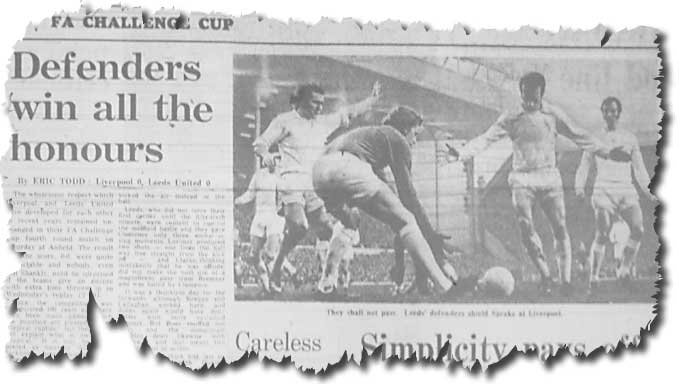 Matches between fierce rivals Liverpool and Leeds United were among
the highlights of every season in the early 1970s. The fixture carried
with it a guarantee of high quality, ultra competitive football. Even
when manager Bill Shankly was taking the Reds through a phase of extensive
team rebuilding between 1970 and 1972, Liverpool could be relied upon
to provide the sternest of tests for any team.
Matches between fierce rivals Liverpool and Leeds United were among
the highlights of every season in the early 1970s. The fixture carried
with it a guarantee of high quality, ultra competitive football. Even
when manager Bill Shankly was taking the Reds through a phase of extensive
team rebuilding between 1970 and 1972, Liverpool could be relied upon
to provide the sternest of tests for any team.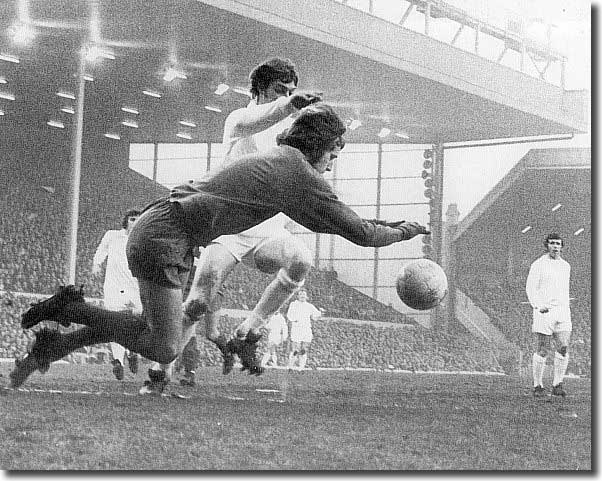 the
week before: Kevin Keegan and John Toshack were building a promising
relationship up front, while the defensively-minded Ian Ross was
deployed to stiffen midfield, with the brief of negating Johnny
Giles' creative abilities on this occasion.
the
week before: Kevin Keegan and John Toshack were building a promising
relationship up front, while the defensively-minded Ian Ross was
deployed to stiffen midfield, with the brief of negating Johnny
Giles' creative abilities on this occasion.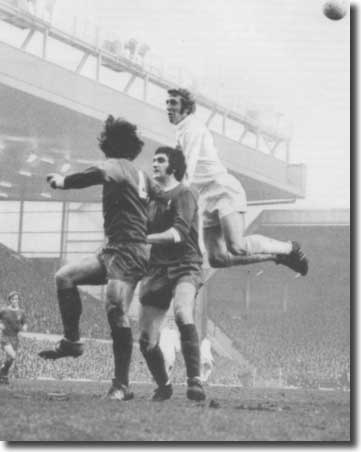 error.
error.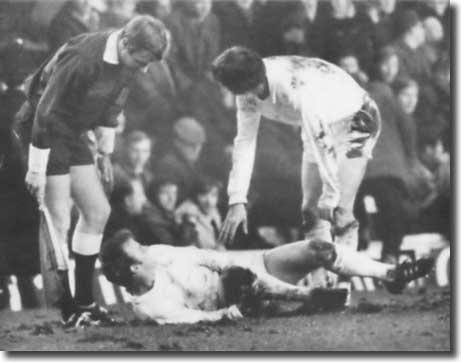 people believed that Leeds had come for a draw and there was some corroborative
evidence. The fact that they had to make minor adjustments consequent
on the absence of the injured Gray and Charlton, visited by influenza
the previous day, may have restricted their original intentions to win.
people believed that Leeds had come for a draw and there was some corroborative
evidence. The fact that they had to make minor adjustments consequent
on the absence of the injured Gray and Charlton, visited by influenza
the previous day, may have restricted their original intentions to win.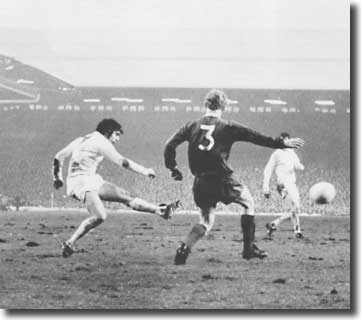 for those more lenient times. When he had his autobiography published
- at that time, one of the few referees to do so - it reflected his high
profile. In the book, he expressed support for various ideas now adopted,
such as a select group of officials handling all the top games, use of
filmed match footage to train referees, greater liaison between referees
and assessors, extensions beyond retirement age for exceptional referees,
and an end to League referees being employed as linesmen in Cup Finals.'
for those more lenient times. When he had his autobiography published
- at that time, one of the few referees to do so - it reflected his high
profile. In the book, he expressed support for various ideas now adopted,
such as a select group of officials handling all the top games, use of
filmed match footage to train referees, greater liaison between referees
and assessors, extensions beyond retirement age for exceptional referees,
and an end to League referees being employed as linesmen in Cup Finals.'